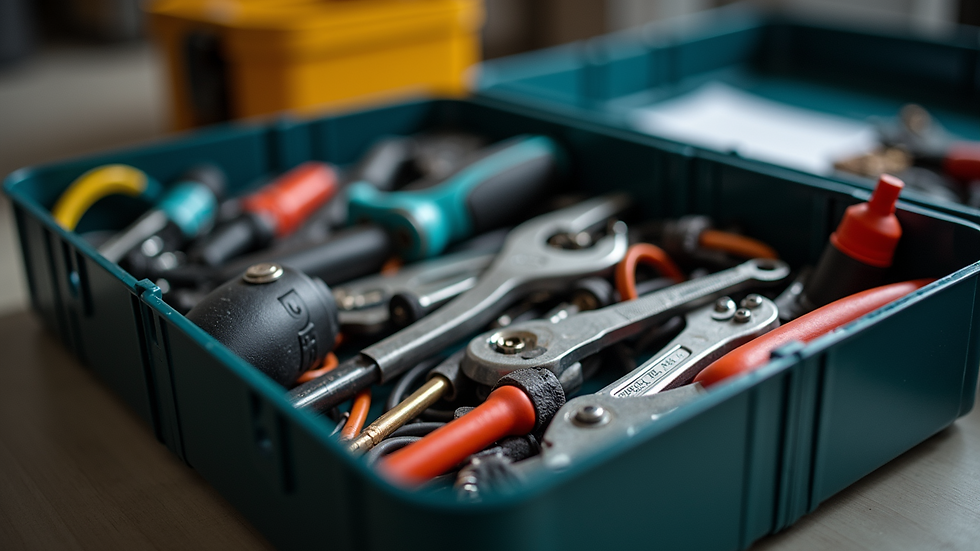Key Electrical Safety Tips for Your Home and Business
- simzhiyonggg65
- Sep 13, 2025
- 4 min read
Electrical safety is crucial for both homes and businesses. Every year, electrical hazards lead to numerous accidents, injuries, and even fatalities. Understanding how to manage electrical systems safely can protect you, your family, and your employees. In this post, we will explore essential electrical safety tips that everyone should know.
Understanding Electrical Hazards
Electrical hazards can arise from various sources. These include faulty wiring, overloaded circuits, and improper use of electrical appliances. Recognizing these hazards is the first step toward preventing accidents.
Faulty Wiring: Old or damaged wiring can cause short circuits and fires. Regular inspections can help identify issues before they become dangerous.
Overloaded Circuits: Plugging too many devices into one outlet can overload the circuit. This can lead to overheating and potential fires.
Improper Use of Appliances: Using appliances for purposes they were not designed for can lead to accidents. Always follow the manufacturer's instructions.
Regular Inspections
One of the best ways to ensure electrical safety is through regular inspections. This applies to both residential and commercial properties.
Hire a Professional: Consider hiring a licensed electrician to conduct thorough inspections. They can identify potential hazards that you might overlook.
Check for Signs of Wear: Look for frayed wires, scorch marks, or flickering lights. These can be signs of underlying issues that need immediate attention.
Use Ground Fault Circuit Interrupters (GFCIs)
GFCIs are essential for areas where water and electricity may come into contact, such as kitchens and bathrooms.
What They Do: GFCIs monitor the flow of electricity and can shut off power if they detect an imbalance. This helps prevent electric shocks.
Installation: Ensure that GFCIs are installed in all wet areas of your home or business. Regularly test them to ensure they are functioning correctly.
Educate Your Family and Employees
Knowledge is power when it comes to electrical safety. Educating those around you can significantly reduce the risk of accidents.
Safety Drills: Conduct regular safety drills to ensure everyone knows what to do in case of an electrical emergency.
Provide Training: For businesses, consider offering training sessions on electrical safety. This can help employees understand the risks and how to mitigate them.
Avoid Overloading Outlets
Overloading outlets is a common mistake that can lead to serious hazards.
Use Power Strips Wisely: If you need to use multiple devices, opt for power strips with built-in circuit breakers. This adds an extra layer of protection.
Limit Devices: Be mindful of how many devices you plug into a single outlet. A good rule of thumb is to limit it to two devices per outlet.
Keep Electrical Appliances Away from Water
Water and electricity do not mix. Keeping electrical appliances away from water sources is vital for safety.
Designate Safe Areas: In kitchens and bathrooms, ensure that appliances are placed away from sinks and bathtubs.
Use Waterproof Covers: For outdoor appliances, use waterproof covers to protect them from rain and moisture.
Use Extension Cords Sparingly
While extension cords can be convenient, they should not be used as a permanent solution.
Temporary Use: Use extension cords only for temporary situations. If you find yourself relying on them frequently, consider installing additional outlets.
Check Ratings: Ensure that the extension cord is rated for the devices you plan to use. Using a cord with a lower rating can lead to overheating.
Install Smoke Alarms and Carbon Monoxide Detectors
Smoke alarms and carbon monoxide detectors are essential safety devices that can save lives.
Regular Testing: Test these devices monthly to ensure they are functioning properly. Replace batteries at least once a year.
Placement: Install smoke alarms in every bedroom and on every level of your home or business. Carbon monoxide detectors should be placed near sleeping areas.
Know How to Respond to Electrical Emergencies
In case of an electrical emergency, knowing how to respond can make a significant difference.
Shut Off Power: If you suspect an electrical fire, shut off the power at the main circuit breaker if it is safe to do so.
Call for Help: Always call emergency services if there is a fire or if someone has been electrocuted. Do not attempt to handle severe situations on your own.
Use the Right Tools
When working with electrical systems, using the right tools is essential for safety.
Insulated Tools: Use insulated tools to reduce the risk of electric shock. These tools are designed to protect you from electrical currents.
Wear Protective Gear: If you are working on electrical systems, wear rubber-soled shoes and gloves to provide additional protection.
Keep Electrical Areas Clear
Keeping areas around electrical panels and outlets clear is vital for safety.
Avoid Clutter: Do not store items near electrical panels or outlets. This can prevent access in case of an emergency.
Label Circuits: Clearly label circuit breakers to make it easier to identify which breaker controls which area of your home or business.
Conclusion: Prioritize Electrical Safety
Electrical safety is not something to take lightly. By following these tips, you can create a safer environment for yourself, your family, and your employees. Remember, prevention is always better than cure. Stay informed, stay safe, and make electrical safety a priority in your home and business.

By implementing these practices, you can significantly reduce the risk of electrical hazards. Stay vigilant and proactive in maintaining electrical safety. Your awareness and actions can make all the difference.


Comments